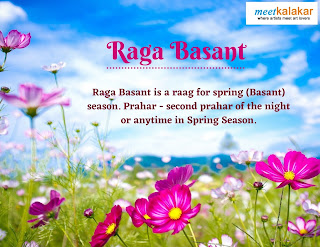Basant is a Hindustani classical raga.
Basant denotes the changing of the season and the newness of spring. This Raga encourages the mind to brush away its selfishness, just like spring-cleaning removes all the cobwebs and creates a fresh start. There are feelings of hope and expectation of a new beginning and the start of a new cycle. However, these emotions are not dependent on the physical change of the season, but are an encouragement of an internal effort to change.
Origin
Vasant is a Sanskrit word for "spring". The word is much older than the Sikh religion and any usage of the word in relation to melody or Sikh tradition is a later rendition of the word.
The variants noted in the Holy Book are Basant-Hindol and Shudh Basant which also called Desi Basant in the local language. Basant is a very old raga dating from the 8th century. Guru Nanak Dev Ji, Guru Amar Das Ji, Guru Ram Das Ji, Guru Arjan Dev Ji and Guru Tegh Bahadar Ji composed Shabads in this raga. Performed in slow tempo, this gentle melody depicts quiet joy.
Basant is a Raag for Spring (Basant) season. It is rendered mostly in Madhya and Tar Saptaks. Songs depicting description of the season, besides Shringar and Virah (Separation Pangs) Ras are common.
This Uttarang Pradhan Raag belongs to Poorvi Thaat. This is a Meend Pradhan Raag and creates heavy atmosphere.
Songs in Raga Basant
1) Ketaki gulab joohi champak ban phoole (Film: Basant Bahar)
2) Basant Hai Aayaa Rangeela (Film : Stree)
3) Kaahe Chhed Mohe (Film : Devdas)
4) Lo Phir Basant Aae ( Non Film Song)
5) Keliche Sukale bag (Marathi)
6) Jivalaga kadhi re yehil tu (Marathi)
7) Lonchanabudharani he (Marathi)
8) Jyeshta tuza putra mala (Marathi)
For more details click on link below
https://meetkalakar.com/Artipedia/Basant
YouTube link -

No comments:
Post a Comment